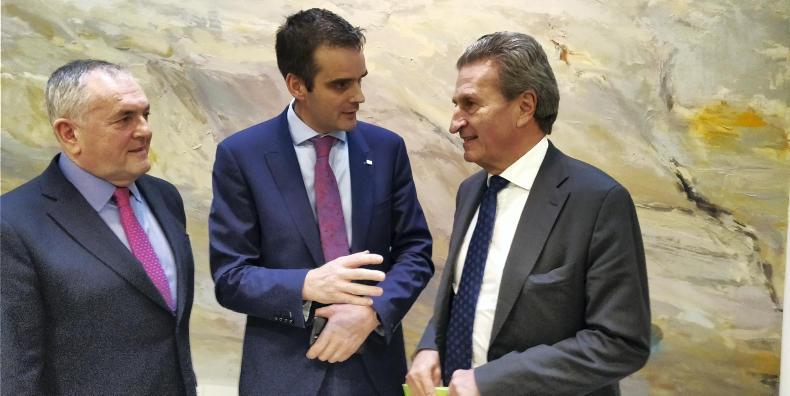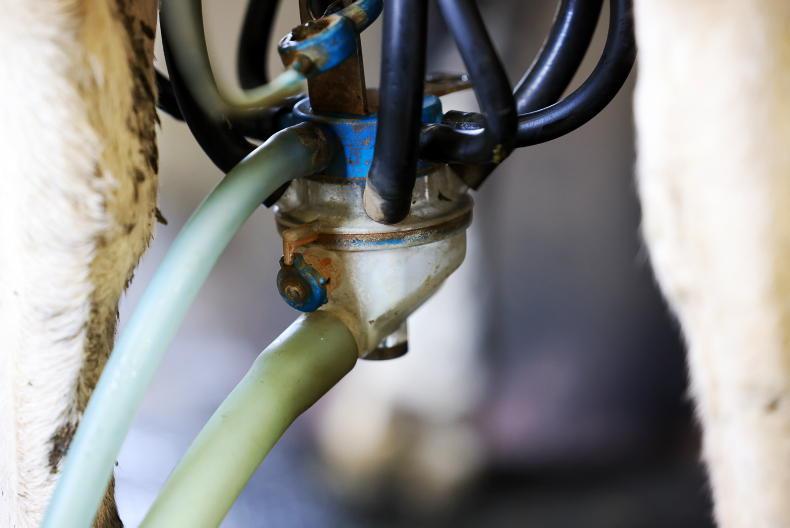The debate on the EU budget moved to Dublin with Commissioner Gunther Oetinger meeting the Taoiseach and the Public Accounts Committee (PAC). This is part of his visits to EU capitals to discuss his communication which set out his policy proposals last month. He will publish formal proposals no later than 2 May and in those we will see how he proposes to fund the deficit caused by the UK departure and the greater ambitions the EU has on defence and refugee management.
CAP cuts
Initial fears that the agriculture budget, which funds the CAP, could be cut by up to 30%, seem to be receding. The Commissioner indicated to the PAC on Tuesday that he was leaning towards a 5% to 10% cut and said that he had to be realistic about dealing with the Brexit deficit.
The Commissioner was particularly incisive on the UK and was strongly of the view that negotiations were made impossible because of lack of clarity on the UK’s position.
Ireland has already indicated that it is prepared to increase its EU funding commitment and the Commissioner is looking for members to increase their contributions from 1.0% of gross national value to 1.1% or more.
Asking for more money is never a popular request, particularly to the large net contributors. However, with Brexit there is a pressure on the remaining 27 members to demonstrate that it is business as usual. To this end, as European Commissioner for Agriculture Phil Hogan continually repeats, a well-funded CAP is essential.
Hogan makes case for CAP
He was at a European Peoples Party (EPP) event in Valencia this week where he again was emphasising the value of the CAP and warning against taking its success for granted. He cautioned against the belief that has served its purpose and also emphasised that farmers shouldn’t have to pay twice for Brexit.
The first cost of Brexit to farmers is the disruption to the market that will be caused by any Brexit deal ranging from 5% in a best case scenario to a worst case 100% in a WTO default deal.
Moral obligation
Aside from the food security angle, there is a further huge moral obligation on the EU to fund its farmers. Nowhere else in the world places the same environmental, welfare or production demands on its farmers. These are over and above legal requirements and the trade-off has to be a well-funded support mechanism for the delivery of standards that move into the area of public goods.
On the subject of public goods, the value of farmers in the rural community was particularly well demonstrated during the recent snow storm when rural road clearing was added to their list of chores.
Moreover, they were of huge assistance to the emergency services in many parts of the country, with tractors being used to assist people and ambulances in many cases.
There is danger in assuming that the rural model built on the CAP will be assumed to be sustainable if it is reduced. Recently, the fast food chain KFC assumed it could switch chicken distributors seamlessly but the consequences were only discovered when restaurants had to close because the deliveries didn’t happen.
It is the same with CAP – its value and the value of farmers to the rural community is massive and we cannot take the risk of losing them to prove it.
Read more
Cutting the CAP budget by 30% is ‘political lunacy’ – Hogan
The debate on the EU budget moved to Dublin with Commissioner Gunther Oetinger meeting the Taoiseach and the Public Accounts Committee (PAC). This is part of his visits to EU capitals to discuss his communication which set out his policy proposals last month. He will publish formal proposals no later than 2 May and in those we will see how he proposes to fund the deficit caused by the UK departure and the greater ambitions the EU has on defence and refugee management.
CAP cuts
Initial fears that the agriculture budget, which funds the CAP, could be cut by up to 30%, seem to be receding. The Commissioner indicated to the PAC on Tuesday that he was leaning towards a 5% to 10% cut and said that he had to be realistic about dealing with the Brexit deficit.
The Commissioner was particularly incisive on the UK and was strongly of the view that negotiations were made impossible because of lack of clarity on the UK’s position.
Ireland has already indicated that it is prepared to increase its EU funding commitment and the Commissioner is looking for members to increase their contributions from 1.0% of gross national value to 1.1% or more.
Asking for more money is never a popular request, particularly to the large net contributors. However, with Brexit there is a pressure on the remaining 27 members to demonstrate that it is business as usual. To this end, as European Commissioner for Agriculture Phil Hogan continually repeats, a well-funded CAP is essential.
Hogan makes case for CAP
He was at a European Peoples Party (EPP) event in Valencia this week where he again was emphasising the value of the CAP and warning against taking its success for granted. He cautioned against the belief that has served its purpose and also emphasised that farmers shouldn’t have to pay twice for Brexit.
The first cost of Brexit to farmers is the disruption to the market that will be caused by any Brexit deal ranging from 5% in a best case scenario to a worst case 100% in a WTO default deal.
Moral obligation
Aside from the food security angle, there is a further huge moral obligation on the EU to fund its farmers. Nowhere else in the world places the same environmental, welfare or production demands on its farmers. These are over and above legal requirements and the trade-off has to be a well-funded support mechanism for the delivery of standards that move into the area of public goods.
On the subject of public goods, the value of farmers in the rural community was particularly well demonstrated during the recent snow storm when rural road clearing was added to their list of chores.
Moreover, they were of huge assistance to the emergency services in many parts of the country, with tractors being used to assist people and ambulances in many cases.
There is danger in assuming that the rural model built on the CAP will be assumed to be sustainable if it is reduced. Recently, the fast food chain KFC assumed it could switch chicken distributors seamlessly but the consequences were only discovered when restaurants had to close because the deliveries didn’t happen.
It is the same with CAP – its value and the value of farmers to the rural community is massive and we cannot take the risk of losing them to prove it.
Read more
Cutting the CAP budget by 30% is ‘political lunacy’ – Hogan









SHARING OPTIONS